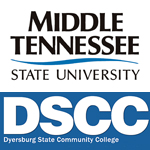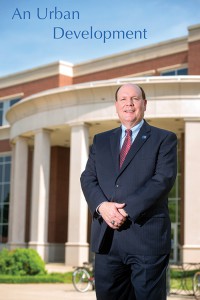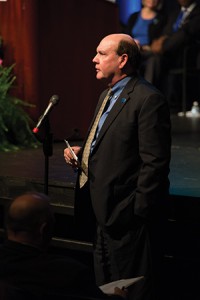When David Urban started his undergraduate education at the University of Virginia, he was convinced he would major in history or government and go to law school. He had never taken a business class. In his sophomore year, however, he enrolled in a microeconomics class taught by a legendary professor at Virginia, Dr. Ken Elzinga. The professor’s passion for the subject and his effectiveness as an instructor got Urban interested in business and led him to enter the McIntire School of Commerce at Virginia, where he concentrated on marketing.
Before joining MTSU in summer 2013, Urban was executive associate dean and marketing professor at the School of Business at Virginia Commonwealth University in Richmond, where he also served stints as interim business dean and chair of the Department of Marketing. Urban believes the similarities between VCU and MTSU—both large, public universities with diverse student bodies in growing regions—will make his transition smoother.
What do you bring to the position of dean of the college of business at MTSU?
I entered academia not intending to become an administrator but to teach and do research, which I did for 19 years. I was involved in faculty governance at the department, school, and university levels at Georgia State University and VCU. Colleagues often encouraged me to move into administration. Once I had achieved my goal of promotion to full professor, I moved into administration as a research center director and then department chair, interim dean, and executive associate dean. I did not seek those roles but was asked to take them. I enjoyed administration. Even in academia, the right person in the right leadership position at the right time can have tremendous positive impact. Having served as interim dean, I began selectively applying for positions as dean of a major business school. A search firm contacted me about Jones College. The more I learned about it, the more I felt my background and experience would fit well.
The key things I bring to the position include a full range of experience with excellent results as a faculty member and an academic administrator. I am always learning, but there is little in academia I have not done. I am a marketing professional and hold the American Marketing Association’s Professional Certified Marketer designation. I have worked with scores of businesses over the years in research, training, and consulting projects. Much of the success of a major business school depends on the interaction between the school and the business community. I can speak the language of people in business. Perhaps most important, I have strong communication skills and have been told I have the ability to inspire people. I believe this will be beneficial in working with faculty, staff, students, and colleagues as well as the college’s external constituents.
What is your vision for Jones College’s future?
Much of my time will be spent listening and learning. I must understand our situation. Then priorities will be clear. I will focus on collaboration and input from internal and external supporters so everyone understands where we are headed, why, and how they will play a part. In five years, we can examine several indicators to measure our progress. At any university, the business school should be the shining example of excellent leadership and management; effective organizational structure and processes; fiscal administration, human resource management, student services, and marketing and branding strategy; and a great place to work. I want to say we practice what we ‘teach.’ Retention and graduation rates and placement statistics are revealing, and we can benchmark our progress compared to our competitive, peer, and aspirant business schools. We should see significant positive movement in all of those statistics.
Leaders at major state universities in the past few years have had to deal with a reduction in state government financial support. I will focus with my development professionals on increased external support in the form of scholarships, professorships, research funding, and endowment. The amount we raise will be a tangible indicator of success in building our programs. It’s important to build the MTSU and Jones College brands. Investment in communication and marketing will be vital as we position Jones College as a superior business school regionally, nationally, and internationally. We will see improvement in our program and school rankings and broaden the recognition and prestige of Jones College.
What role do you see for Jones College within the regional business community, which is considered one of the hottest business and entrepreneurial markets in America right now?
A large proportion of our students are from the Nashville area. Many of our faculty work with businesses in the region, independently or in real-world class projects. Many of our alumni are prominent business and community leaders. Fundraising benefits from such connections, but it is difficult to expect people to support their alma mater financially if they haven’t heard from it since they graduated. It is critical to maintain lines of communication with alumni and to build the quality of our programs and reputation so our alumni’s degrees will increase in value. Aside from fundraising, we should be engaging our friends in the business community to help us evaluate our curricula, to employ our students in internships and full-time jobs, and to seek us out for continuing education and professional development. Universities can also advise. We can provide insights that can help businesses to improve, and I want to encourage that type of activity. I intend to reach out to the business community.
The VCU da Vinci Center for Innovation is a collaboration at VCU— involving the Schools of the Arts, Business, and Engineering and the College of Humanities and Sciences—intended to advance innovation and entrepreneurship through interdisciplinary collaboration. Are there similar, untapped partnerships at MTSU?
I worked closely with the da Vinci Center and on sponsored projects with researchers in medicine, education, political science, life sciences, and other fields. Working with people in other disciplines reveals commonalities. Centers like da Vinci can be catalysts for innovation and entrepreneurship. A program might be housed in one school, but a team orientation of cooperation among cross-disciplinary participants is essential. I see potential partnerships between Jones College and all other MTSU schools and will explore these options with their deans.
What should business schools be doing to help America better compete in the years ahead?
People around the world want to harness the spirit of American business. In the last recession, American businesses became more reflective, concerned with building and maintaining relationships with customers, willing to innovate, and efficient. Similarly, the best business schools have revised classical curricula like the traditional M.B.A.s, created specialized business education programs, become less theoretical and more concerned with improving business practice, and focused on providing better value for the tuition dollar. The keys for major business schools are market focus, balance, and complementarity. We must be constantly aware of current and emerging business trends and willing to change the way we teach in order to respond to the needs of business. Cross-disciplinary programs and new teaching methods are ways we can be more market driven. Faculty must balance research and teaching pursuits, and administrators must support their professional development in both areas. We need to stress the ways these two activities complement each other, for example, by engaging students in faculty research projects.
Peter Drucker, a pioneer in the field of management, said about business that “Culture eats strategy over breakfast.”
Are business schools doing enough to teach leadership?
No strategy can cover every possible operational contingency. A strong culture can provide guidance when people wonder what they should do. In the Navy Supply Corps, our motto was “Service to the fleet.” As an officer, I wanted people working for me to pursue the path that provided maximum service to the crew. That’s where leadership comes in—the ability to inspire and reinforce core values. One can learn about leadership much as one can learn music appreciation, but there is a big difference between appreciating music and knowing how to play an instrument. Business schools can’t teach leadership exclusively in classrooms. We need a full range of opportunities for students to lead—in team projects, internships, student organizations, and community engagement—and practice what they learn in class.
A recent Forbes article wondered aloud if business school curricula adequately prepare today’s students to face the ethical questions related to the business practices that brought America to the economic brink in recent years. What is your response?
No business school can teach students everything about ethical conduct. Such lessons are learned from families, teachers, faith leaders, coworkers, and others. Business professors have a responsibility to engage students in discussions, case studies, and exercises about ethical dilemmas and to explore solutions. We can teach basic rules of ethical conduct. As a Rotarian for 19 years, I have shared with students the Rotary 4-Way Test, four questions about the things we think, say, and do: Is it the truth? Is it fair to all concerned? Will it build goodwill and better friendships? Will it be beneficial to all concerned? If leaders had asked these questions, some high-profile business catastrophes may not have happened.
Thanks, Dean Urban. Good luck.
[Editor’s Note: Business school marketing specialist Sally Govan contributed heavily to this report.]




COMMENTS ARE OFF THIS POST